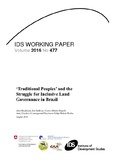| dc.contributor.author | Shankland, Alex | |
| dc.contributor.author | Sullivan, Zoe | |
| dc.contributor.author | Alberto Dayrell, Carlos | |
| dc.contributor.author | Crystina Alvarenga, Anna | |
| dc.contributor.author | Felipe Batista Rocha, Deyvisson | |
| dc.coverage.spatial | Brazil | en |
| dc.date.accessioned | 2016-08-25T14:02:57Z | |
| dc.date.available | 2016-08-25T14:02:57Z | |
| dc.date.issued | 2016-08-24 | |
| dc.identifier.isbn | 978 1 78118 334 2 | |
| dc.identifier.uri | https://opendocs.ids.ac.uk/opendocs/handle/20.500.12413/12185 | |
| dc.description.abstract | In recent decades, Brazil has attracted international interest both for the intensity of its land conflicts and for the extent of its land governance innovations. In this report we argue that these innovations have derived from a land governance model shaped by the country’s decentralised political structures and by the nature of the interactions taking place across the boundary between state and civil society actors, including rural social movements. In recent years, particularly under the Workers’ Party (PT) governments of Presidents Lula da Silva and Dilma Rousseff, this has led to significant gains in recognition of and redistribution to some of the most marginalised of Brazil’s rural communities. However, we conclude that the model’s potential to deliver genuinely inclusive land governance has run up against certain limits. These relate to the underlying conceptualisation of land rights embedded in the country’s legal framework, and to the political economy of law-making and policy implementation in Brazil.
This study examines these issues in relation to a particular subset of the rural population, known in Brazil as Povos e Comunidades Tradicionais (PCTs) or ‘Traditional Peoples and Communities’. This term covers a wide range of population groups who practise natural resource management strategies on a collective basis using ‘traditional’ territorial governance mechanisms. The study focuses on land governance in the Norte de Minas or North of Minas Gerais State, a region where SDC’s partner organisation HEKS (Swiss Church Aid) has supported a wide range of initiatives seeking to strengthen the livelihoods and territorial rights of PCTs. The North of Minas is a frontier region between the savannah zone of central Brazil and the country’s semi-arid interior that has been the focus of a number of large-scale investments by national and international mining, forestry and agribusiness interests, as well as government initiatives to create protected areas and resettle landless farmers. The study examines the different modalities that have been used to promote inclusive land governance in the region and the range of strategies used by PCT social movements and their allies to secure their territorial rights. It concludes with a preliminary assessment of the future viability of these strategies in the radically altered national political context that has emerged since the impeachment of President Dilma Rousseff in May 2016. | en |
| dc.language.iso | en | en |
| dc.publisher | Institute of Development Studies | en |
| dc.relation.ispartofseries | IDS Working Paper;477 | |
| dc.rights | This publication is copyright, but may be reproduced by any method without fee for teaching or nonprofit purposes, but not for resale. Formal permission is required for all such uses, but normally will be granted immediately. For copying in any other circumstances, or for re-use in other publications, or for translation or adaptation, prior written permission must be obtained from the publisher and a fee may be payable. | en |
| dc.rights.uri | http://www.ids.ac.uk/files/dmfile/IDSOpenDocsStandardTermsOfUse.pdf | en |
| dc.subject | Environment | en |
| dc.title | ‘Traditional Peoples’ and the Struggle for Inclusive Land Governance in Brazil | en |
| dc.type | IDS Working Paper | en |
| dc.rights.holder | Institute of Development Studies | en |
| dc.identifier.team | Power and Popular Politics | en |
| rioxxterms.funder | Default funder | en |
| rioxxterms.version | VoR | en |

